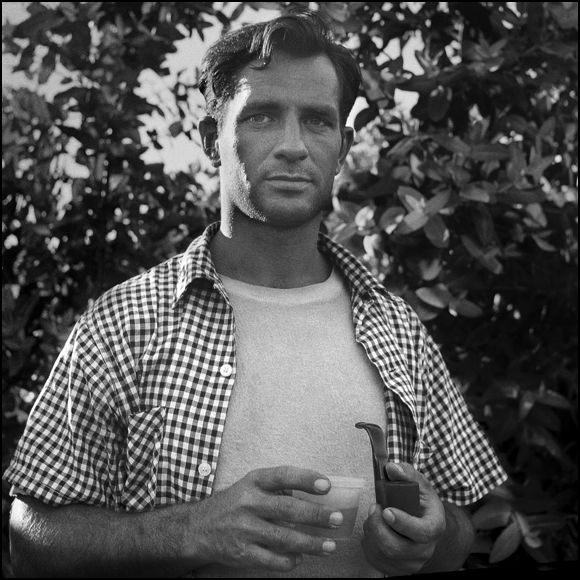I think I could have put up with being in Jack Kerouac’s presence for about five minutes without screaming, but this 1959 clip of him on Steve Allen’s show is fun. The Beat writer even interrupts his discomfort and self-mythologizing, bullshit answers to read from On the Road.
From John Clellon Holmes’ 1952 New York Times Magazine piece, “This Is the Beat Generation,” which introduced the movement to the masses: “Any attempt to label an entire generation is unrewarding, and yet the generation which went through the last war, or at least could get a drink easily once it was over, seems to possess a uniform, general quality which demands an adjective … The origins of the word ‘beat’ are obscure, but the meaning is only too clear to most Americans. More than mere weariness, it implies the feeling of having been used, of being raw. It involves a sort of nakedness of mind, and, ultimately, of soul; a feeling of being reduced to the bedrock of consciousness. In short, it means being undramatically pushed up against the wall of oneself. A man is beat whenever he goes for broke and wagers the sum of his resources on a single number; and the young generation has done that continually from early youth.
Its members have an instinctive individuality, needing no bohemianism or imposed eccentricity to express it. Brought up during the collective bad circumstances of a dreary depression, weaned during the collective uprooting of a global war, they distrust collectivity. But they have never been able to keep the world out of their dreams. The fancies of their childhood inhabited the half-light of Munich, the Nazi-Soviet pact, and the eventual blackout. Their adolescence was spent in a topsy-turvy world of war bonds, swing shifts, and troop movements. They grew to independent mind on beachheads, in gin mills and USO’s, in past-midnight arrivals and pre-dawn departures. Their brothers, husbands, fathers or boy friends turned up dead one day at the other end of a telegram. At the four trembling corners of the world, or in the home town invaded by factories or lonely servicemen, they had intimate experience with the nadir and the zenith of human conduct, and little time for much that came between. The peace they inherited was only as secure as the next headline. It was a cold peace. Their own lust for freedon, and the ability to live at a pace that kills (to which the war had adjusted them), led to black markets, bebop, narcotics, sexual promiscuity, hucksterism, and Jean-Paul Sartre. The beatness set in later.
It is a postwar generation, and, in a world which seems to mark its cycles by its wars, it is already being compared to that other postwar generation, which dubbed itself ‘lost’. The Roaring Twenties, and the generation that made them roar, are going through a sentimental revival, and the comparison is valuable. The Lost Generation was discovered in a roadster, laughing hysterically because nothing meant anything anymore. It migrated to Europe, unsure whether it was looking for the ‘orgiastic future’ or escaping from the ‘puritanical past.’ Its symbols were the flapper, the flask of bootleg whiskey, and an attitude of desperate frivolity best expressed by the line: ‘Tennis, anyone?’ It was caught up in the romance of disillusionment, until even that became an illusion. Every act in its drama of lostness was a tragic or ironic third act, and T.S. Eliot’s The Waste Land was more than the dead-end statement of a perceptive poet. The pervading atmosphere of that poem was an almost objectless sense of loss, through which the reader felt immediately that the cohesion of things had disappeared. It was, for an entire generation, an image which expressed, with dreadful accuracy, its own spiritual condition.
But the wild boys of today are not lost. Their flushed, often scoffing, always intent faces elude the word, and it would sound phony to them. For this generation lacks that eloquent air of bereavement which made so many of the exploits of the Lost Generation symbolic actions. Furthermore, the repeated inventory of shattered ideals, and the laments about the mud in moral currents, which so obsessed the Lost Generation, do not concern young people today. They take these things frighteningly for granted. They were brought up in these ruins and no longer notice them. They drink to ‘come down’ or to ‘get high,’ not to illustrate anything. Their excursions into drugs or promiscuity come out of curiousity, not disillusionment.”

